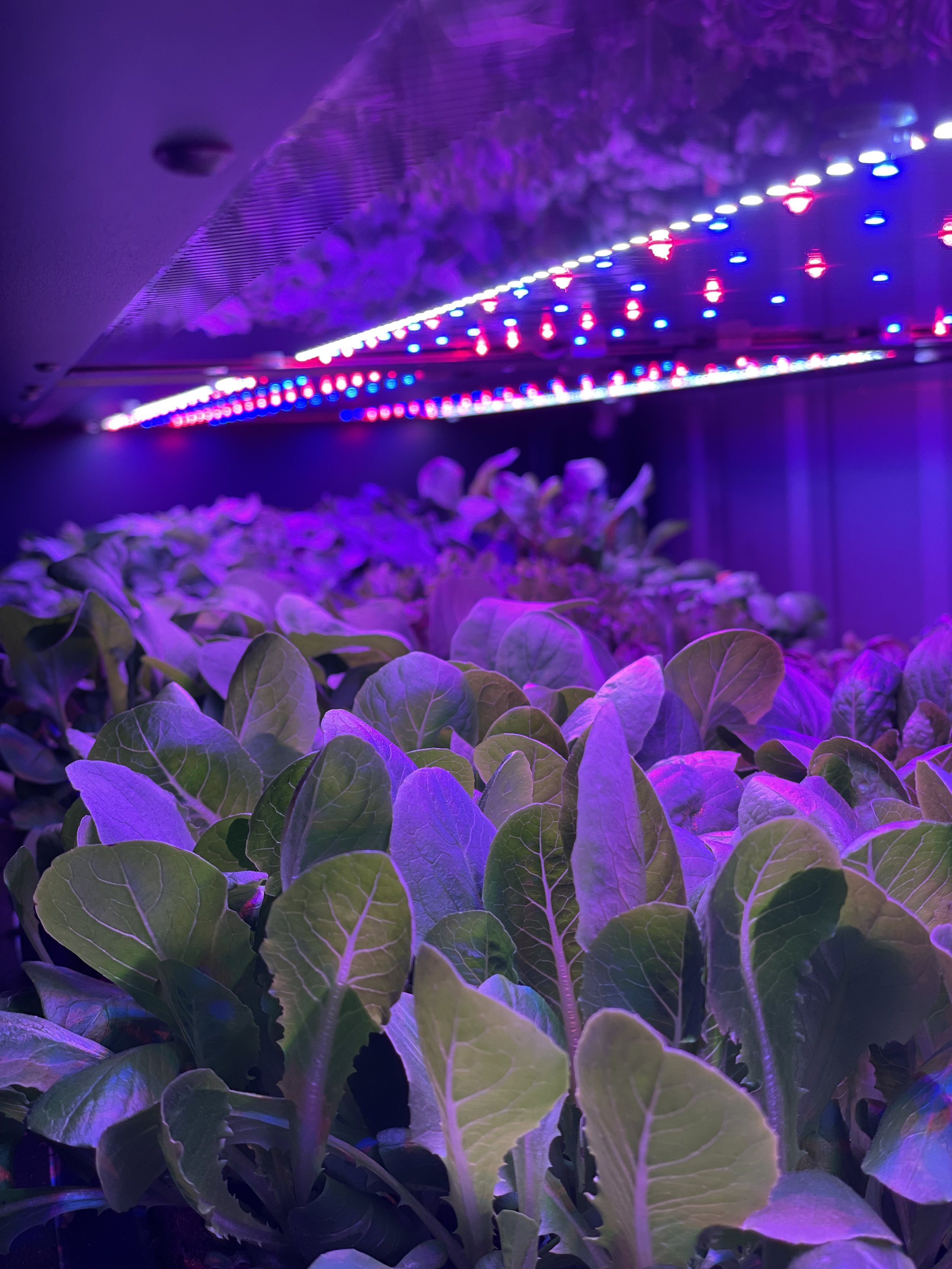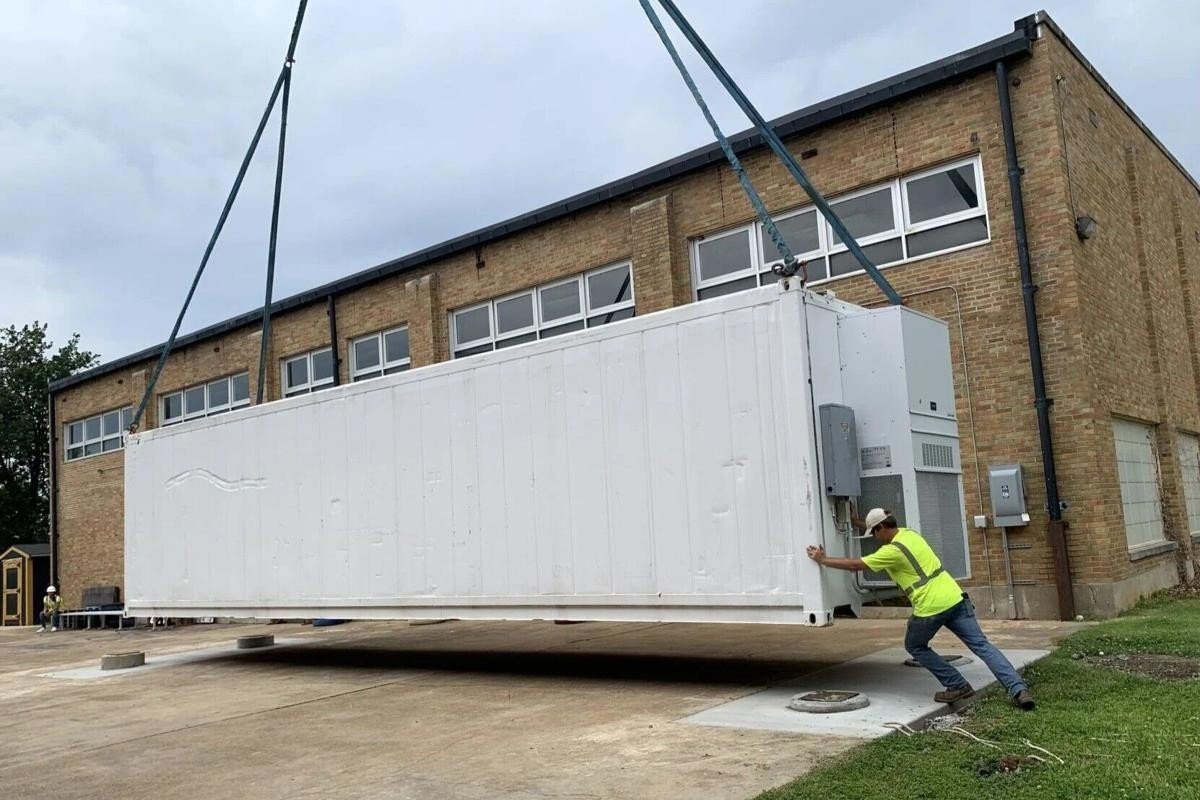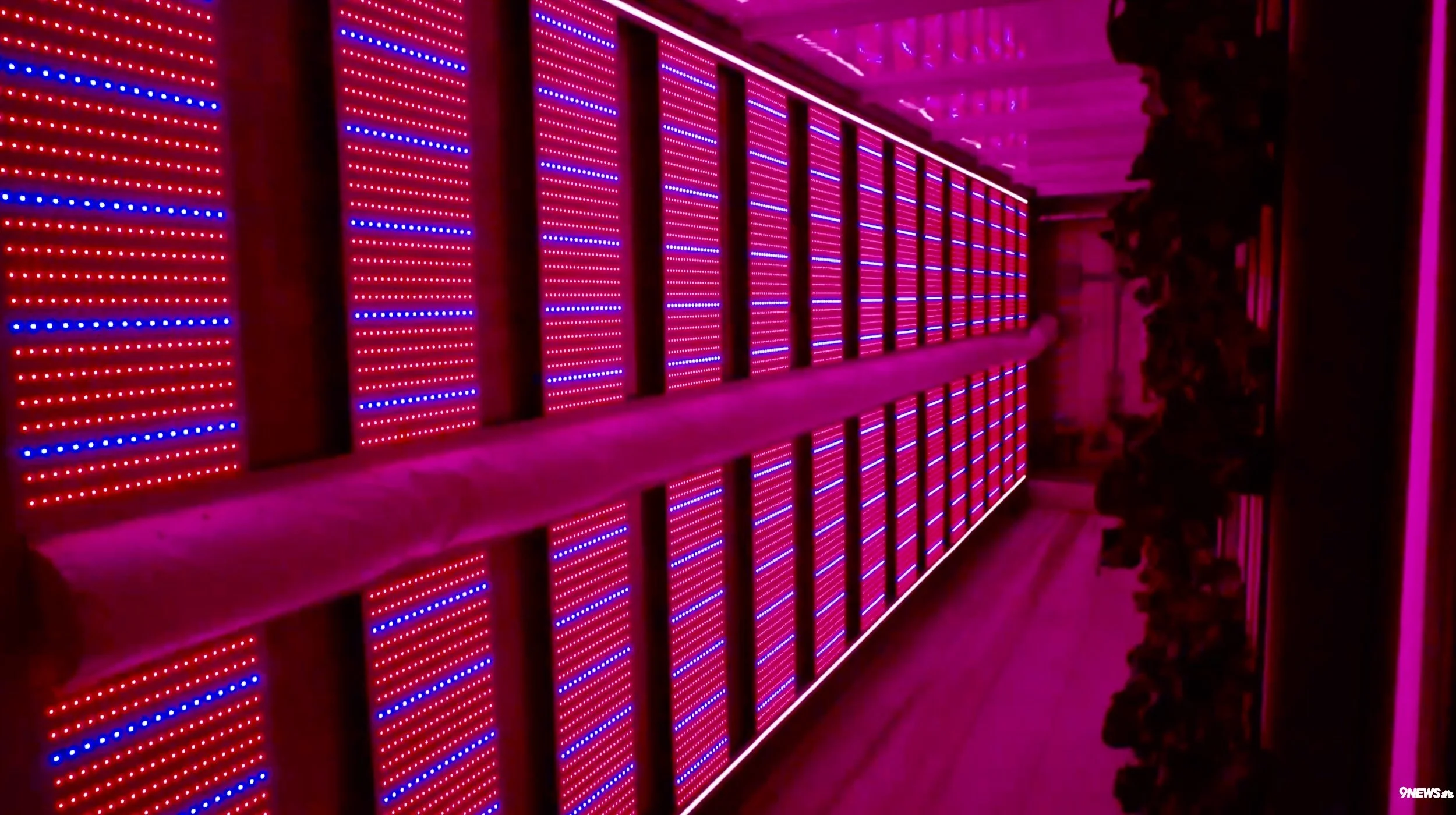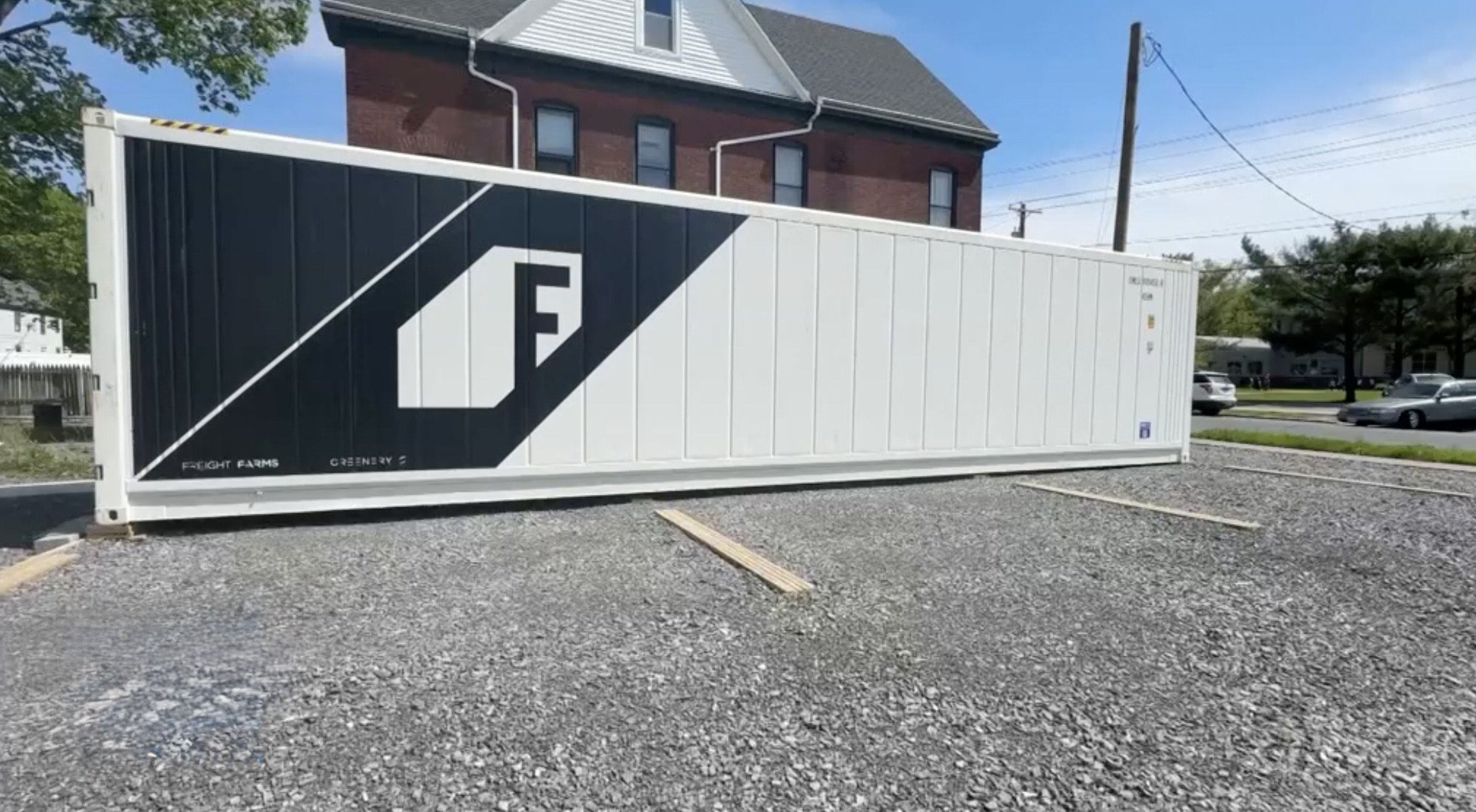
News About Farming in Shipping Containers & Limited Indoor Spaces
Canadian Shipping Container Farm Manufacturer “Growcer” Acquires Freight Farms’ Assets, Pledges To Support Growers Worldwide
Update: We've won the bid to acquire Freight Farms' assets.
A few months ago, one of our top competitors filed for bankruptcy, and the Growcer team sprang into action to help their community of farmers keep growing.
One of the options we explored was throwing our hat into the ring to purchase substantially all of the company's assets (such as an inventory of complete farms, spare parts, software, all intellectual property, and subscriptions etc.). We rallied a group of key partners, and I'm thrilled to say that we were able to make it happen.
US (MO): University City High School Installs Smart Farm Container - Video
University City High School's growing agriculture program just grew some more. A shipping container fitted for hydroponics farming arrived at the school this week, bringing with it the potential for students to learn farming first-hand and grow their own food for lunch periods and businesses.
"They'll get to see firsthand how food is produced, starting from seed up to actual harvesting," said Pamela Lester, the teacher heading University City High's Agriculture and Sustainability Program.
The high school added an agriculture class during the 2023-2024 school year and saw a quick and rising interest from students.
USA - COLORADO - VIDEO: Grand County Farmer Grows Food Year Round for Guests and Food Banks
For over 90 years this 700 acre family guest ranch has provided folks from around the world with authentic western ranch vacations. Nestled in its own private mountain valley in Granby, Colorado, Drowsy Water Ranch promises the opportunity to disconnect from your daily hustle and bustle, and reconnect with family and friends under the backdrop of big mountains and starry skies. Under the same ownership/management since 1977, The Fosha’s have developed a world-renowned reputation for unpretentious quality.
We warmly welcome you to experience the true spirit of the West at our Colorado dude ranch all-inclusive vacation.
The Detailed Analysis of 40-Foot Container Vertical Farming - A Comprehensive Guide for Beginners - By Grow4Max
Tips for Growers
- Start Small: If you're new to container vertical farming, start with a small-scale project to learn the ropes before scaling up.
- Research Your Crops: Different plants have different requirements. Understand the specific needs of the crops you want to grow and adjust your systems accordingly.
- Regular Monitoring: Continuously monitor all the systems (lights, irrigation, nutrients, environment) to catch any issues early and make timely adjustments.
- Learn from Experience: Keep detailed records of your farming activities, including plant growth, system performance, and any problems encountered. Use this data to improve your future operations.
How An Indoor Farm Will Help The Ottawa Mission
The Ottawa Mission is using technology combined with farming to feed thousands.
The new initiative uses indoor “vertical farms” to grown healthy, fresh locally produced greens for use in the Mission’s meal programs to serve vulnerable community.
Growcer, RBC and the Ottawa Mission launched the initiative at Bayview Yards Thursday morning.
“I think it’s going to provide us very close to what we need in terms of the meals,” Peter Tilley, Ottawa Mission CEO, said.
“We’re doing over a million meals a year. This will provide us with close to the lettuce, green, leafy product that we need for those meals. Of course, we’ll still have to buy other items or produce at the usual market prices.”
NEWFOUNDLAND, CANADA - VIDEO: Inside This Grey Shipping Container in St. Anthony is a hydroponic Bounty of Green Produce
Grocery shoppers in St. Anthony can now purchase fresh, locally-grown, spinach, kale and lettuce on their supermarket shelves, all year round.
Sabri Farms grows its produce inside a 40-foot shipping container, also called their hydroponics facility.
Sabri Farms manager Felicia Hillier said they produce fresh products that can be packaged and sent to the grocery store — even in the coldest temperatures.
"Like it is the dead of winter and we have to use a heat gun to get our door open and we are going out with this fresh products to the stores. It was amazing," said Hillier.
Carbon Less Future Makes Reforestation Visible With Vertical Farming
Latvia-based Carbon Less Future (CLF) is building a new model for reforestation, one shipping container at a time. Their container-based tree-growing system, designed around vertical farming principles, can cultivate up to 33,600 saplings in a single cycle. The system is intended not only to optimize growing conditions but to make reforestation visible, accessible, and verifiable.
"A lot of companies donate money to plant trees, but never see them grow. We wanted to change that," says Aigars Jacuks, COO and Co-founder at CLF. Together with CEO and Co-founder Aivis Garais, the team developed a twelve-meter container equipped with a glazed ten-meter wall that allows passersby to observe the growth process in real time.
VIDEO- Hydroponic Farm Grows Vegetables 365 Days A Year For Local Communities
For many people, going to the grocery store and selecting fresh vegetables is part of their routine. But not everyone has that luxury and food insecurity is an issue we see in many communities.
One man is trying to help change that.
“We’re actually standing inside a 40-foot shipping container that’s been outfitted as you can see to grow vegetables. It’s hydroponic, so it runs on. We just supply water, nutrients and lighting and we grow vegetables that way,” said James Paul, executive director of Blacque Acres, a nonprofit organization that was just an idea three years ago, but has become a reality to help address food insecurity.
USA: South Carolina Prison’s Vertical Farming Program Gets Grant To Help Pay Inmates
Beginning next month, inmates at South Carolina’s women’s prison will be able to receive agricultural training and a stipend upon release with the help of a statewide grant program.
The South Carolina philanthropy Power:Ed announced a $97,000 grant this month to the nonprofit Impact Justice, which is working with the state Department of Corrections to run the agricultural program at the state’s prison for women.
Beyond growing an expected 48,000 pounds of lettuce each year for the prison’s kitchens, the program is meant to train women in the fast-growing field of hydroponics, which means growing plants in water instead of soil, to help them get jobs soon after leaving prison.
Restaurant Roundup: Blindfolded Bites, Rooftop Tacos, and Shipping Container Farming
Some would say Seattle’s food scene is at its best when the impact stretches beyond the immediate benefits of nourishment and taste.
That’s certainly the case at Cherry Street Farm, where Hip Hop is Green founder Keith Tuckets uses a shipping container hydroponic farm to help feed Seattle families, with future plans to educate kids about climate justice, sustainability, and vegan cooking. Currently, a community kitchen is under construction and eventually, the space will host live music and other teaching opportunities.
Where Food Justice Meets Hip-Hop: Inside Seattle's Cherry Street Farm
Nestled on a small hill between the vibrantly colored houses of East Cherry Street is a farm capable of producing two-and-a-half acres' worth of crops, all in a metal freight container the size of a school bus.
To any passersby, Cherry Street Farm looks no different from a misplaced shipping unit. Indeed, the hydroponics setup, which grows plants in a controlled climate using a nutrient-enhanced water drip, is built within a converted shipping container by Freight Farms based in Boston, and it's Seattle's first Freight Farms hydroponics lab.
Stepping into the container is like walking into a completely new biome. First, the humid air hits the nose with the fragrance of fresh earth. It took a minute for my eyes to adjust to the intense glare of the red and blue LED lights before I could focus on the grow operation: four floor-to-ceiling sliding plant walls.
An Ohio Zoo Is Using Hydroponics To Feed Animals Homegrown Greens
Cincinnati is not the only zoo producing its own food and sourcing items locally. Mike Maslanka, senior nutritionist at the Smithsonian National Zoo and chair of the Association of Zoos and Aquariums’ nutrition advisory group, estimates every one of the 238 AZA-accredited institutions is growing or sourcing at least some of their animals’ food locally.
“So, that's whole prey, that's insects, that's bamboo and brows, hay, produce,” Maslanka said.
A poster at the Cincinnati Zoo explains the process behind the giraffe's food. Isabel Nissley / The Ohio Newsroom
But, the number of zoos using hydroponics is smaller. Neither of zoos in Cleveland or Columbus currently grow food hydroponically.
Maslanka said that could be due to high costs of the technology.
VIDEO: Wyoming Students are Growing Salad in a Former Shipping Container
A group of Central Wyoming College (CWC) students have repurposed an 8-by-40-foot shipping container to successfully grow delicious vegetables and herbs without soil, sunshine and acres of space in a sustainable way, reports Cowboy State Daily. These students are enrolled on a Regenerative Small-Scale Farming AAS degree. According to CWC, it is the first of its kind in Wyoming.
“We’ve been fortunate to be able to bring this kind of technology to the area,” shares local food and agriculture instructor, Ethan Page. “I think this is one of two freight farms in the state, and the only one that’s kind of served, or has like an educational purpose,” he adds.
BRITISH COLUMBIA: How The U.S.-Canada Trade War Is Fueling Vertical Farming In B.C.
When Ranjot Singh Dhaliwal started Sustainabite Fresh Farms in a shipping container in Surrey, he knew he couldn’t repeat the mistakes of hi-tech indoor farms closing their doors around the Lower Mainland. “What I have seen in vertical farms is they put a lot of money in. So much unnecessary technology that was not needed. While I was building it, my main focus was to make it profitable,” explained Dhaliwal.
Dhaliwal has seen many indoor farms fail in recent years; a sentiment echoed by Chris Arthur of Sky Harvest, a organic microgreens farm inside an unassuming industrial space in Richmond.
The Challenge and Opportunity of Container Farming
The most recent monthly Indoor Ag Conversations webinar hosted by Indoor Ag-Con, held June 3, focused on “The State and Future of Container Farming.”
Container farming is a form of small-scale controlled environment agriculture — i.e. indoor or vertical farming — that is often built inside shipping containers. The units are self-contained, able to be moved to the necessary location and allow for small-scale out-of-season growth of fresh produce.
They are not without their challenges, however. The talk included four panelists from the container farming industry discussing the impacts of Freight Farms and its recent collapse, the challenges of the industry, and where it goes from here.
KAZAKHSTAN - The First “Machine Farm” Opened in Almaty
BoomGrow can grow leafy greens, microgreens, edible flowers, herbs, and even mushrooms. From planting to harvest, it takes 35-38 days , which is faster than in open ground or a greenhouse.
At the same time, the growing process uses 95% less water, soil, and fuel than traditional methods.The modular vertical farm is a development of the Malaysian startup BoomGrow . It operates in Malaysia, Indonesia, the Philippines and Singapore. Kazakhstan is the first Central Asian country where the project was scaled up.
The farm was developed and assembled in Malaysia and delivered to Almaty, now the container is located on the territory of the Kazakh National Research Technical University named after K. I. Satpayev.
SOUTH KOREA: Local Governments Across The Country are Working on a Project to Create a Smart Farm
Buk-gu, Gwangju Metropolitan City, is also pushing for a "one stone and three trillion" project to protect the environment and increase jobs for the youth and the elderly by installing a "container smart farm" that grows eco-friendly crops using public idle land in the city center. Recently, Buk-gu created a container-type urban smart farm in the parking lot space of Buk-gu Sae Village Association. The container-type smart farm is 40㎡ of land and can stack crops up to six layers without taking up a large area, so you can get a large amount of harvest compared to the use of the land.
New Vertical Farm at Illinois State University to Serve as Example of Sustainable Urban Agriculture
“This project is about more than just growing food,” said Illinois State University President Aondover Tarhule. “It’s about harnessing the power of technology to reduce our dependence on traditional, resource-demanding agricultural methods. Vertical farming technology can be used to address some of the biggest challenges we face, including food security, environmental responsibility, and sustainability.”
The Vertical Farm uses a repurposed shipping container with an enclosed, controlled environment for growing plants year-round. The 40-foot-by-8-foot (320 square feet) container is designed using a vertical hydroponic growing system with a recirculating nutrient solution and light-emitting diode (LED) lighting system. The Vertical Farm unit will be able to grow 4,600 plants, production equivalent to 1-2 acres of field production, using 95% less water or approximately 5 gallons of water per day.



















